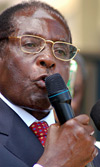
A rare piece of good news in Zimbabwe this week, as Jestina Mukoko, a well-known Zimbabwean human rights activist, was released on bail after three months in brutal policy custody. Mukoko, the leader of the human rights organization the Zimbabwe Peace Project, was reportedly taken from her home by 15 armed men early last December. She told the press that she was tortured and assaulted while being held in Zimbabwe’s Chikurubi maximum-security prison. At least eight other activists were freed along with Mukoko after paying $600 bail and providing a property deed. However, despite the euphoria surrounding Mukoko’s release, experts note that scores of political prisoners remain behind bars and — as U.S. State Department spokesman Gordon Duguid told AP — should be “immediately freed.”
Prime Minister Morgan Tsvangirai had predicated his acceptance of a unity deal on Mukoko’s release, but his happiness over the outcome was tempered by his emphasis on those members of his party, the Movement for Democratic Change, who remain in jail on trumped-up charges. However, in an obvious effort to support the frail unity government, Tsvangirai also noted publicly that Mugabe supported the release of these political prisoners, but that ZANU-PF Attorney General Johannes Tomana was refusing to comply – which strains credibility. If Mugabe wanted these prisoners released they probably would be, unless his hold on his own power is starting to slip more rapidly than has been reported.
Many of Mugabe’s ZANU-PF officials were angered by his decision to join the unity government because it meant fewer opportunities to line their pockets, but Mugabe has traditionally been able to marginalize those voices within his party who take issue with his tactics.

